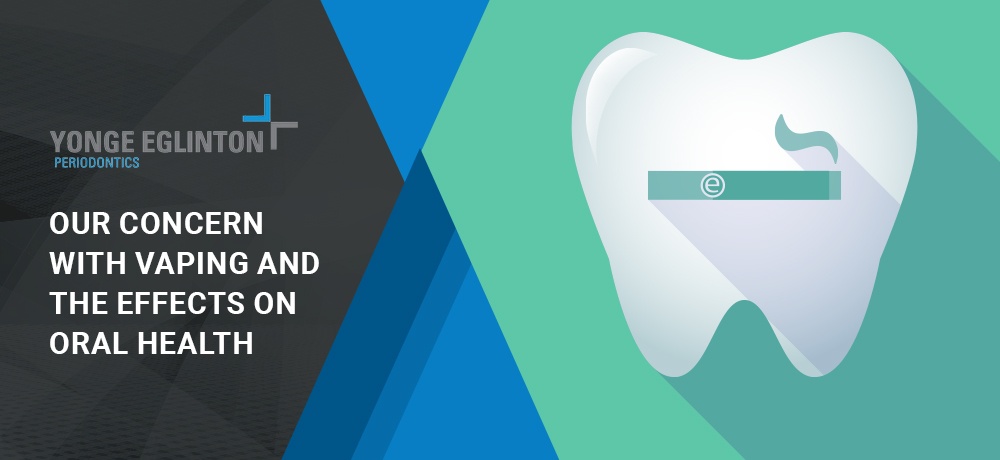Our Concern with Vaping and the Effects on Oral Health

Link: https://www.dentalnews.com/2023/09/30/vaping-threatens-oral-health-as-much-as-smoking/
At Yonge Eglinton Periodontics, we have been getting questioned by patients if vaping can be bad for their mouth and overall health. Vaping, the act of inhaling and exhaling aerosol produced by electronic cigarettes, has gained popularity in recent years as a supposedly safer alternative to traditional tobacco smoking. However, Dr. Andrew Kay and our Toronto Periodontics team believe there is mounting evidence suggesting that vaping is not without its health risks, particularly when it comes to oral health. In this article, we will explore how vaping can be detrimental to oral health.
- Dry Mouth (Xerostomia): One of the most immediate and common oral health issues associated with vaping is dry mouth. Vaping can reduce saliva production, as nicotine and other chemicals in e-cigarettes can hinder the functioning of salivary glands. Saliva is essential for maintaining oral health as it helps to cleanse the mouth, neutralize acids, and prevent tooth decay. When saliva production is compromised, it can lead to an increased risk of cavities, gum disease, and bad breath.
- Gum Disease (Periodontal Disease): Vaping can also contribute to the development of gum disease. The chemicals in e-cigarette aerosols can irritate and inflame gum tissues. Over time, this inflammation can progress to periodontal disease, characterized by gum recession, bleeding, and even tooth loss. Nicotine, a common component in e-cigarettes, can also constrict blood vessels, reducing blood flow to the gums and impeding their ability to heal. Learn more about more about how gum disease can affect you by clicking here.
- Tooth Decay: E-cigarette liquids often contain sugars, which can feed harmful oral bacteria, leading to the formation of acid-producing plaque. The acidity of these bacteria erodes tooth enamel, leading to cavities. Additionally, the aerosol itself can be acidic, further contributing to enamel erosion. Over time, this erosion can result in tooth sensitivity and an increased risk of cavities.
- Oral Lesions: Vaping can cause the development of oral lesions or ulcers. The heat and chemicals in e-cigarettes can irritate the oral mucosa, leading to the formation of painful sores in the mouth. These lesions can be uncomfortable and may require time to heal, disrupting daily activities and potentially leading to complications if not addressed promptly.
- Altered Taste and Smell: Vaping can affect the senses of taste and smell. This is partly due to the presence of chemicals in e-cigarette aerosols that can dull these senses. Individuals may find it more challenging to detect unpleasant tastes and odors associated with spoiled or harmful food, which could lead to a range of health issues beyond oral health.
- Mouth and Throat Irritation: Vaping can cause mouth and throat irritation, which may manifest as a persistent sore throat or cough. These symptoms are often attributed to the heat and chemicals in e-cigarette aerosols. The irritation can promote an inhospitable environment for oral tissues, exacerbating oral health problems.
- Mucosal Changes: Research suggests that vaping can lead to changes in the mucosal lining of the oral cavity. These changes may include reduced cellular integrity and increased inflammation, which can be a precursor to more severe oral health problems.
- Cancer Risk: While vaping is generally considered less harmful than traditional smoking in terms of cancer risk, it is not without some risk. Some e-cigarette aerosols contain carcinogens, and long-term vaping may still increase the risk of oral cancer, particularly in those who combine vaping with other risk factors such as heavy alcohol consumption or a history of oral cancer.
In conclusion, our Toronto Periodontists at Yonge Eglinton Periodontics believe vaping is detrimental to oral health in various ways. It can lead to dry mouth, gum disease, tooth decay, oral lesions, altered taste and smell, mouth and throat irritation, mucosal changes, and even an increased risk of oral cancer. It's essential for any of our patients who use e-cigarettes to be aware of these risks and take measures to protect their oral health, such as practicing good oral hygiene, visiting our Toronto dental clinic regularly, and, most importantly, considering quitting vaping altogether. Ultimately, while further research is needed to fully understand the long-term effects of vaping on oral health, the existing evidence suggests that it is not a risk-free alternative to traditional tobacco smoking. For any questions or to book an appointment, please click here.